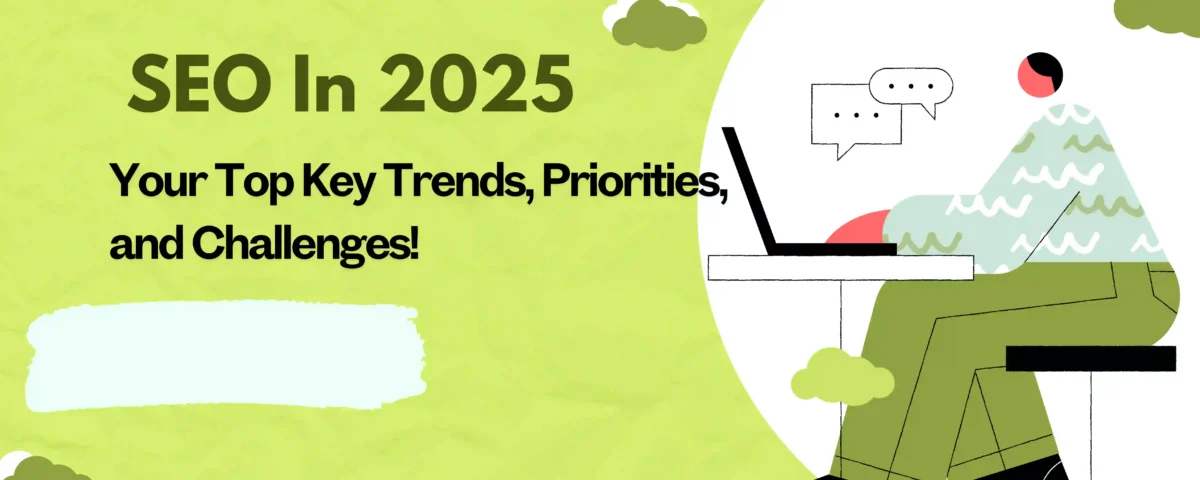SEO in 2025: Your Top Key Trends, Priorities, and Challenges!

Google Warns: Beware Of Fake Googlebot Traffic!
December 19, 2024
What Are the Differences Between Frontend & Backend Developers?
December 23, 2024SEO in 2025: Your Top Key Trends, Priorities, and Challenges!
Search Engine Optimization (SEO) is constantly evolving, and 2025 is no exception. The strategies that worked a few years ago may not yield the same results today. With Google, Bing, and other search engines rolling out AI-powered tools and new algorithms, businesses must stay ahead of the curve to maintain visibility and relevance. Here’s a comprehensive guide to understanding the top trends, priorities, and challenges that will define SEO in 2025.
Key Trends to Watch in 2025
1. AI-Powered Search Optimization
AI continues to dominate the SEO landscape, with Google’s AI algorithm advancements like MUM (Multitask Unified Model) and RankBrain taking center stage. These systems interpret search intent more accurately, prioritize user experience, and value authoritative content. Leveraging AI tools for keyword research, competitor analysis, and content creation will be critical in 2025.
2. Voice Search Optimization
As smart assistants like Siri, Alexa, and Google Assistant become more integrated into daily life, voice search is projected to account for over 50% of online searches in 2025. Businesses must optimize for conversational queries and long-tail keywords, ensuring that their content aligns with the way people speak rather than type.
3. Core Web Vitals and User Experience (UX)
Google’s Core Web Vitals, introduced in 2021, remain pivotal. In 2025, metrics like loading speed, interactivity, and visual stability will have an even greater impact on rankings. Websites that fail to provide a seamless user experience will find it difficult to compete.
4. Visual and Multimodal Search
Search engines are increasingly prioritizing visual search capabilities. With tools like Google Lens, users can search using images instead of text. Optimizing images with descriptive alt text, proper metadata, and high quality will be essential.
5. E-E-A-T (Experience, Expertise, Authority, Trustworthiness)
Content quality has always been important, but E-E-A-T takes it to the next level. Search engines evaluate whether your content reflects real-world experience, expertise, and authority while being trustworthy. In 2025, building your brand’s online reputation and establishing thought leadership will be key.
Priorities for SEO Success in 2025
1. Focus on Intent-Driven Content
User intent is the cornerstone of modern SEO. In 2025, businesses must craft content that answers users’ specific questions and addresses their pain points. This means going beyond generic keywords to focus on intent-based searches like informational, navigational, and transactional queries.
2. Mobile-First Optimization
Mobile traffic continues to dominate, and Google’s mobile-first indexing has made it clear: if your site isn’t mobile-friendly, your rankings will suffer. Prioritize responsive designs, fast-loading pages, and mobile-specific features to ensure accessibility and engagement.
3. Local SEO & Hyper-Local Targeting
With the rise of “near me” searches, local SEO remains a priority. Optimize for Google My Business, include location-specific keywords, and encourage customer reviews to boost local visibility. For brick-and-mortar businesses, hyper-local targeting can make or break your online presence.
4. Video Content Optimization
Video content is expected to account for 82% of all consumer traffic by 2025. Platforms like YouTube and TikTok are pivotal for search engine rankings. Focus on creating engaging video content, optimizing titles, descriptions, and tags, and utilizing transcripts for better SEO.
5. Sustainability in SEO
As the world becomes more eco-conscious, sustainability-focused keywords and green practices are gaining traction. Highlighting your brand’s commitment to sustainability can set you apart in competitive industries.
Challenges to Overcome in 2025
1. Adapting to Algorithm Changes
Google’s frequent updates keep SEO professionals on their toes. Staying updated and adapting quickly to changes is crucial to maintain or improve rankings. Partnering with experienced SEO experts or utilizing advanced analytics tools can help you navigate this challenge.
2. Balancing AI Automation and Human Creativity
While AI tools offer incredible efficiency, over-reliance can lead to generic content. Striking a balance between AI-driven insights and human creativity will ensure your content remains engaging and unique.
3. Combating Misinformation
The internet is rife with misinformation, and search engines are tightening their grip on inaccurate content. Businesses must ensure their content is accurate, well-researched, and verified to maintain credibility.
4. Increased Competition
As more businesses recognize the importance of SEO, competition for high-value keywords will intensify. Smaller businesses may find it challenging to compete with larger companies with bigger budgets. Identifying niche keywords and leveraging unique selling points will be vital.
5. Data Privacy Regulations
Stricter data privacy laws like GDPR and CCPA impact how businesses collect and use customer data. Ensuring compliance while maintaining effective personalization and targeting will be a complex but necessary task.
Practical Tips to Stay Ahead
- Invest in AI and Automation Tools: Use AI-powered tools to streamline keyword research, analytics, and content generation tasks.
- Create Evergreen Content: Develop timeless, high-quality content that remains relevant over the years.
- Optimize for Featured Snippets: Structure your content to answer questions concisely and increase your chances of appearing in Google’s “Position Zero.”
- Leverage Analytics: Regularly monitor your website’s performance and user behavior to refine your strategies.
- Collaborate with Influencers: Build partnerships with influencers to expand your reach and gain backlinks.
- Update Content Regularly: Refresh older posts to maintain their relevance and rankings.
Conclusion
The SEO landscape in 2025 is marked by rapid innovation and increasing complexity. From AI-driven tools to the growing importance of user intent and sustainability, businesses must adopt a proactive approach to remain competitive. You can ensure your brand’s online visibility and long-term success by staying updated on trends, focusing on user-centric strategies, and overcoming key challenges.
Prepare for the future of SEO now, and 2025 will be a year of growth and opportunity for your business.


